Commercial and Corporation Law: Coffee Machine Case Analysis Report
VerifiedAdded on 2023/01/19
|7
|1876
|71
Report
AI Summary
This report analyzes a case involving the purchase of a faulty coffee machine through an e-commerce website, focusing on the rights and remedies available to the consumer under New Zealand law. The report examines the obligations of businesses regarding product quality, safety, and security, referencing the Sales of Goods Act and the Contract and Commercial Law Act 2017. It explores the applicability of these laws to the case, considering the definition of a consumer and the online transaction. The report details remedies available to the consumer, including damages, specific performance, and cancellation, while referencing relevant case law. The analysis concludes that the consumer has grounds for legal action due to the supplier's failure to meet acceptable quality standards, and outlines the potential outcomes and recourse available to the consumer under the applicable legislation. The report also considers the Fair Trading Act and misrepresentation of the product by the supplier.
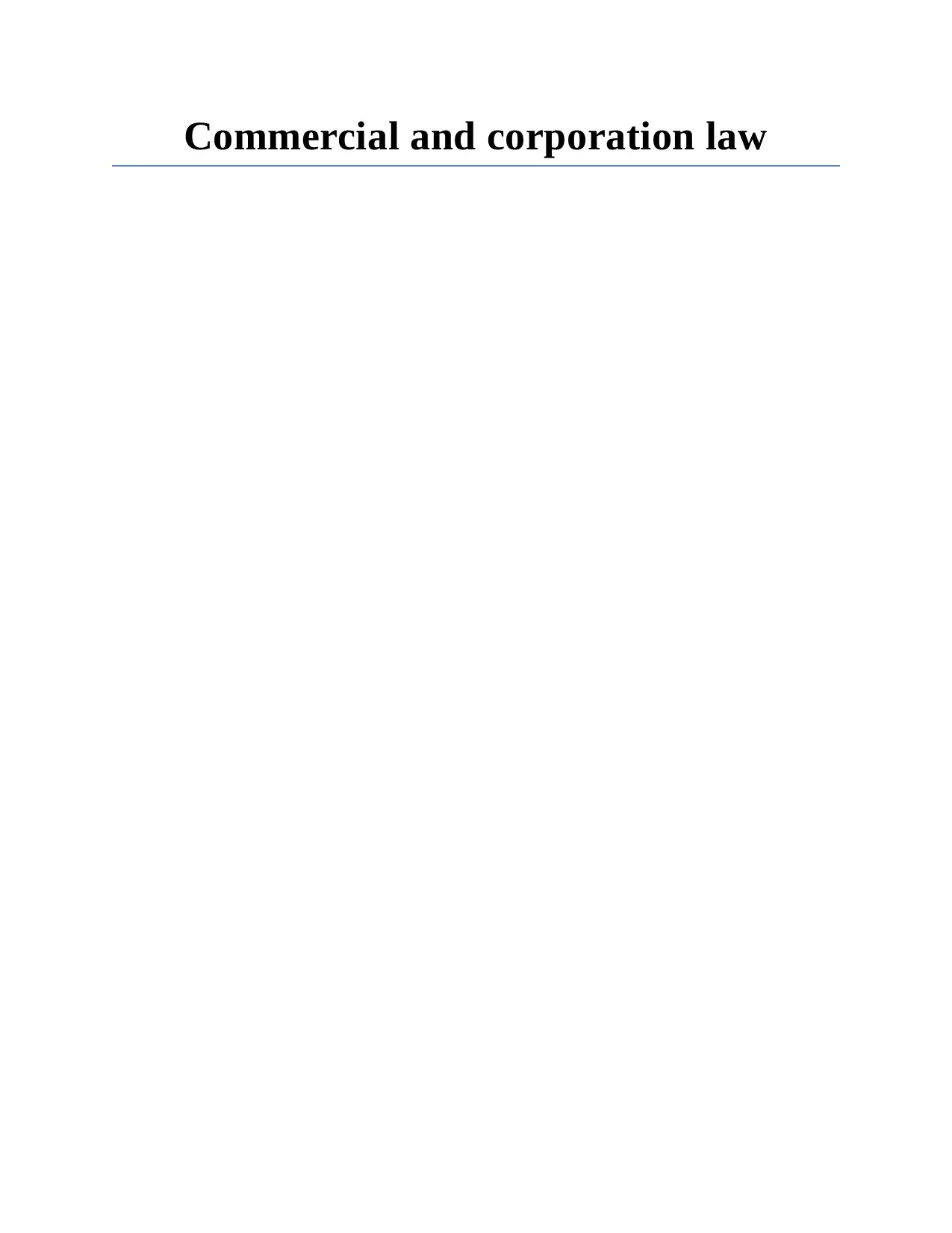
Commercial and corporation law
Paraphrase This Document
Need a fresh take? Get an instant paraphrase of this document with our AI Paraphraser
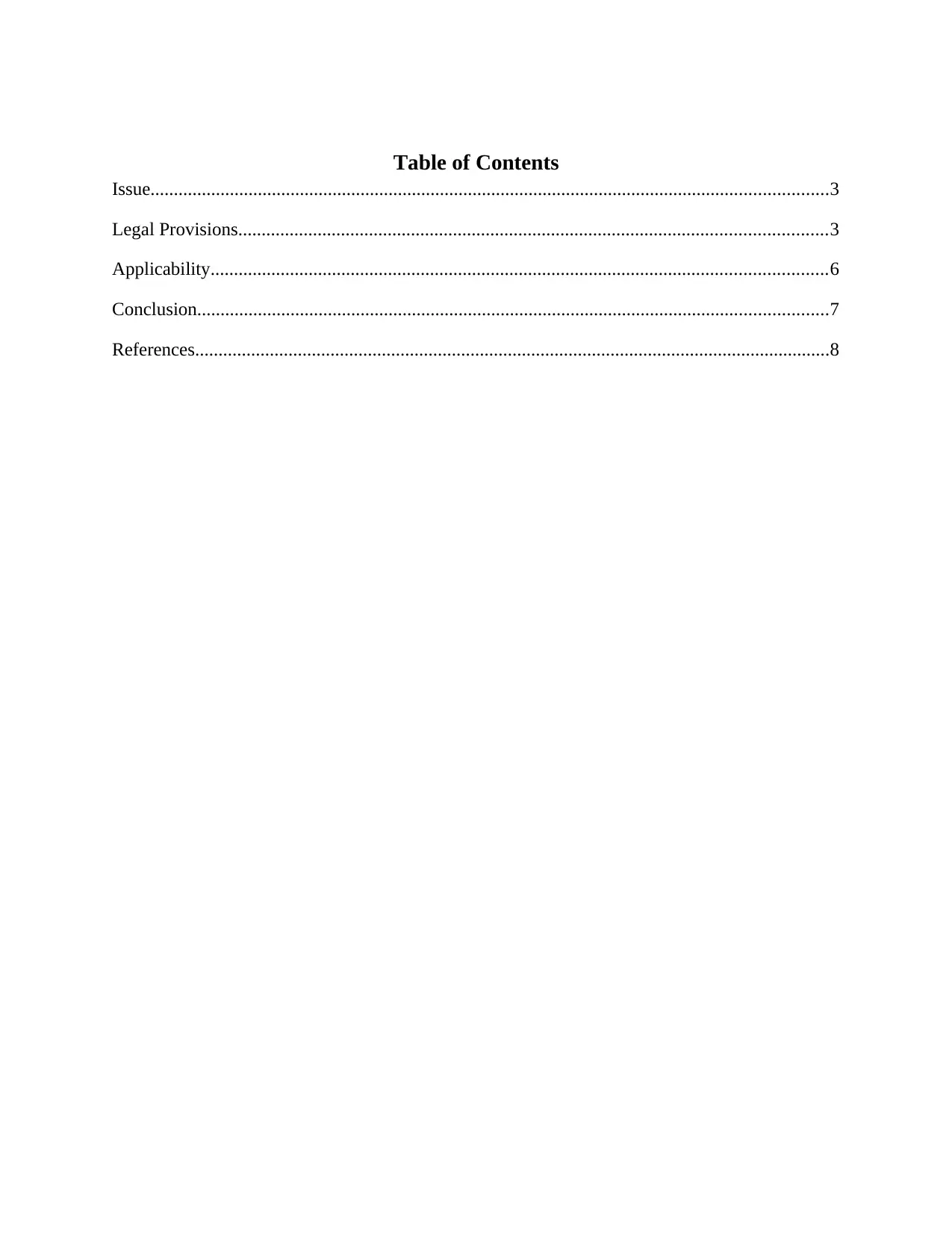
Table of Contents
Issue.................................................................................................................................................3
Legal Provisions..............................................................................................................................3
Applicability....................................................................................................................................6
Conclusion.......................................................................................................................................7
References........................................................................................................................................8
Issue.................................................................................................................................................3
Legal Provisions..............................................................................................................................3
Applicability....................................................................................................................................6
Conclusion.......................................................................................................................................7
References........................................................................................................................................8
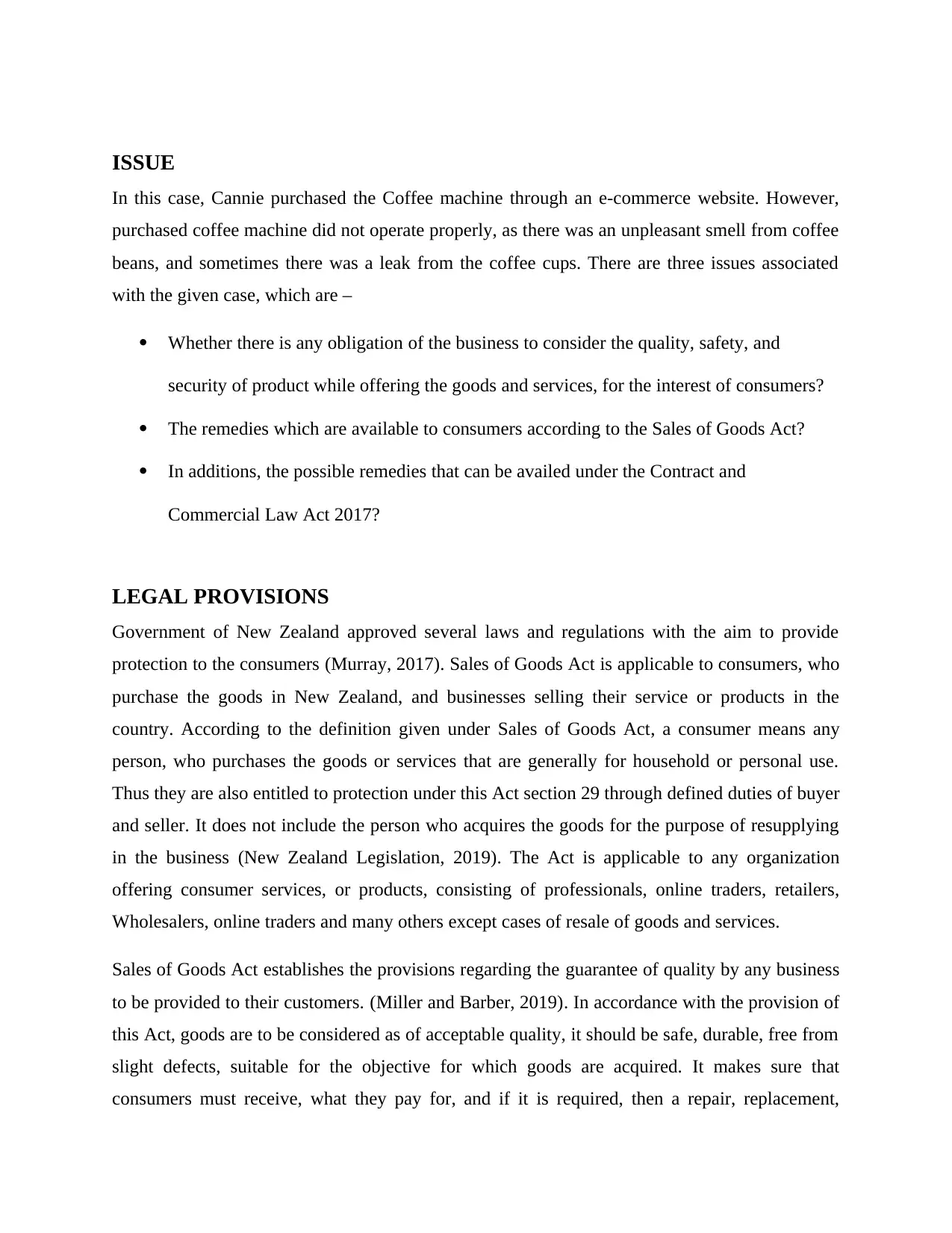
ISSUE
In this case, Cannie purchased the Coffee machine through an e-commerce website. However,
purchased coffee machine did not operate properly, as there was an unpleasant smell from coffee
beans, and sometimes there was a leak from the coffee cups. There are three issues associated
with the given case, which are –
Whether there is any obligation of the business to consider the quality, safety, and
security of product while offering the goods and services, for the interest of consumers?
The remedies which are available to consumers according to the Sales of Goods Act?
In additions, the possible remedies that can be availed under the Contract and
Commercial Law Act 2017?
LEGAL PROVISIONS
Government of New Zealand approved several laws and regulations with the aim to provide
protection to the consumers (Murray, 2017). Sales of Goods Act is applicable to consumers, who
purchase the goods in New Zealand, and businesses selling their service or products in the
country. According to the definition given under Sales of Goods Act, a consumer means any
person, who purchases the goods or services that are generally for household or personal use.
Thus they are also entitled to protection under this Act section 29 through defined duties of buyer
and seller. It does not include the person who acquires the goods for the purpose of resupplying
in the business (New Zealand Legislation, 2019). The Act is applicable to any organization
offering consumer services, or products, consisting of professionals, online traders, retailers,
Wholesalers, online traders and many others except cases of resale of goods and services.
Sales of Goods Act establishes the provisions regarding the guarantee of quality by any business
to be provided to their customers. (Miller and Barber, 2019). In accordance with the provision of
this Act, goods are to be considered as of acceptable quality, it should be safe, durable, free from
slight defects, suitable for the objective for which goods are acquired. It makes sure that
consumers must receive, what they pay for, and if it is required, then a repair, replacement,
In this case, Cannie purchased the Coffee machine through an e-commerce website. However,
purchased coffee machine did not operate properly, as there was an unpleasant smell from coffee
beans, and sometimes there was a leak from the coffee cups. There are three issues associated
with the given case, which are –
Whether there is any obligation of the business to consider the quality, safety, and
security of product while offering the goods and services, for the interest of consumers?
The remedies which are available to consumers according to the Sales of Goods Act?
In additions, the possible remedies that can be availed under the Contract and
Commercial Law Act 2017?
LEGAL PROVISIONS
Government of New Zealand approved several laws and regulations with the aim to provide
protection to the consumers (Murray, 2017). Sales of Goods Act is applicable to consumers, who
purchase the goods in New Zealand, and businesses selling their service or products in the
country. According to the definition given under Sales of Goods Act, a consumer means any
person, who purchases the goods or services that are generally for household or personal use.
Thus they are also entitled to protection under this Act section 29 through defined duties of buyer
and seller. It does not include the person who acquires the goods for the purpose of resupplying
in the business (New Zealand Legislation, 2019). The Act is applicable to any organization
offering consumer services, or products, consisting of professionals, online traders, retailers,
Wholesalers, online traders and many others except cases of resale of goods and services.
Sales of Goods Act establishes the provisions regarding the guarantee of quality by any business
to be provided to their customers. (Miller and Barber, 2019). In accordance with the provision of
this Act, goods are to be considered as of acceptable quality, it should be safe, durable, free from
slight defects, suitable for the objective for which goods are acquired. It makes sure that
consumers must receive, what they pay for, and if it is required, then a repair, replacement,
⊘ This is a preview!⊘
Do you want full access?
Subscribe today to unlock all pages.

Trusted by 1+ million students worldwide
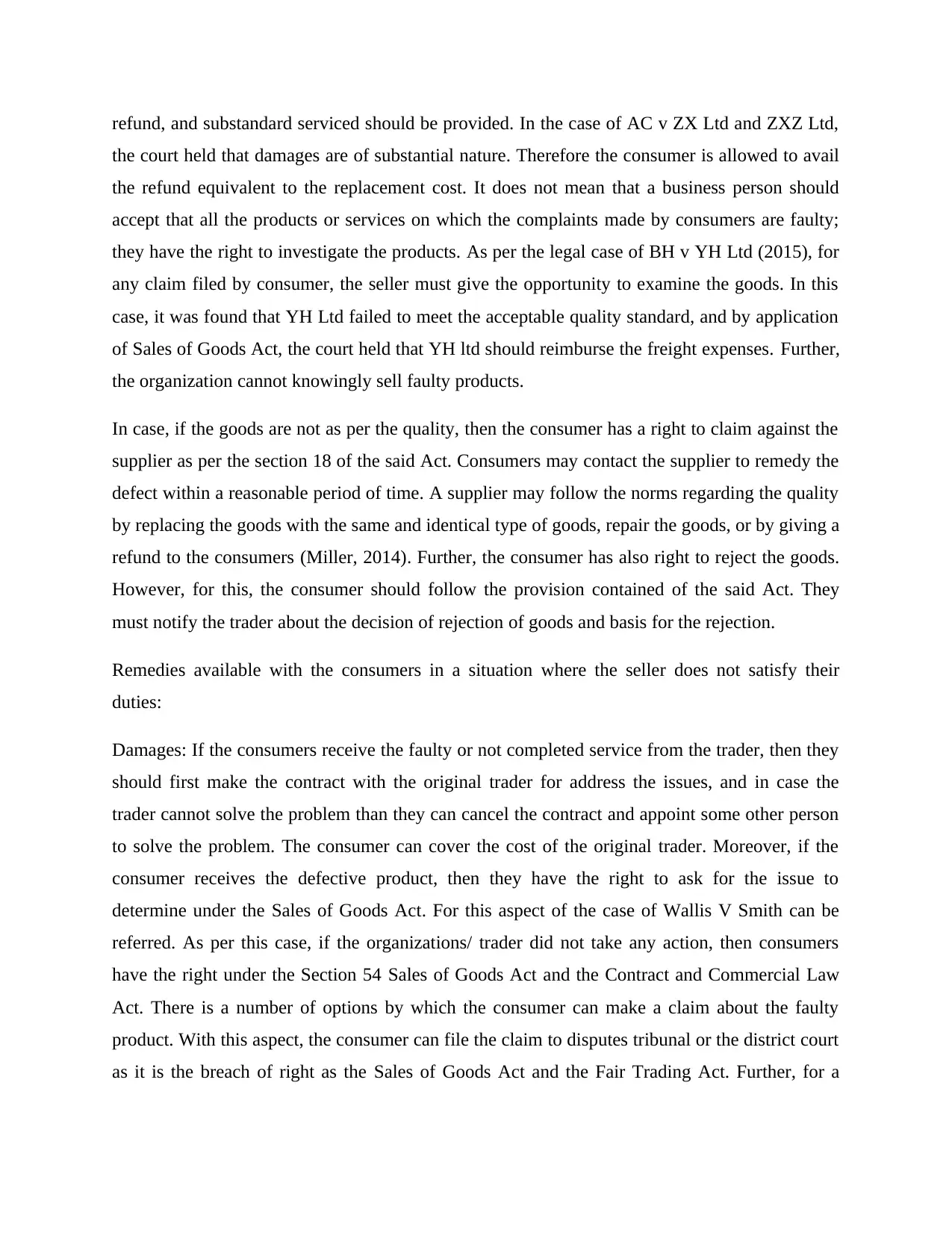
refund, and substandard serviced should be provided. In the case of AC v ZX Ltd and ZXZ Ltd,
the court held that damages are of substantial nature. Therefore the consumer is allowed to avail
the refund equivalent to the replacement cost. It does not mean that a business person should
accept that all the products or services on which the complaints made by consumers are faulty;
they have the right to investigate the products. As per the legal case of BH v YH Ltd (2015), for
any claim filed by consumer, the seller must give the opportunity to examine the goods. In this
case, it was found that YH Ltd failed to meet the acceptable quality standard, and by application
of Sales of Goods Act, the court held that YH ltd should reimburse the freight expenses. Further,
the organization cannot knowingly sell faulty products.
In case, if the goods are not as per the quality, then the consumer has a right to claim against the
supplier as per the section 18 of the said Act. Consumers may contact the supplier to remedy the
defect within a reasonable period of time. A supplier may follow the norms regarding the quality
by replacing the goods with the same and identical type of goods, repair the goods, or by giving a
refund to the consumers (Miller, 2014). Further, the consumer has also right to reject the goods.
However, for this, the consumer should follow the provision contained of the said Act. They
must notify the trader about the decision of rejection of goods and basis for the rejection.
Remedies available with the consumers in a situation where the seller does not satisfy their
duties:
Damages: If the consumers receive the faulty or not completed service from the trader, then they
should first make the contract with the original trader for address the issues, and in case the
trader cannot solve the problem than they can cancel the contract and appoint some other person
to solve the problem. The consumer can cover the cost of the original trader. Moreover, if the
consumer receives the defective product, then they have the right to ask for the issue to
determine under the Sales of Goods Act. For this aspect of the case of Wallis V Smith can be
referred. As per this case, if the organizations/ trader did not take any action, then consumers
have the right under the Section 54 Sales of Goods Act and the Contract and Commercial Law
Act. There is a number of options by which the consumer can make a claim about the faulty
product. With this aspect, the consumer can file the claim to disputes tribunal or the district court
as it is the breach of right as the Sales of Goods Act and the Fair Trading Act. Further, for a
the court held that damages are of substantial nature. Therefore the consumer is allowed to avail
the refund equivalent to the replacement cost. It does not mean that a business person should
accept that all the products or services on which the complaints made by consumers are faulty;
they have the right to investigate the products. As per the legal case of BH v YH Ltd (2015), for
any claim filed by consumer, the seller must give the opportunity to examine the goods. In this
case, it was found that YH Ltd failed to meet the acceptable quality standard, and by application
of Sales of Goods Act, the court held that YH ltd should reimburse the freight expenses. Further,
the organization cannot knowingly sell faulty products.
In case, if the goods are not as per the quality, then the consumer has a right to claim against the
supplier as per the section 18 of the said Act. Consumers may contact the supplier to remedy the
defect within a reasonable period of time. A supplier may follow the norms regarding the quality
by replacing the goods with the same and identical type of goods, repair the goods, or by giving a
refund to the consumers (Miller, 2014). Further, the consumer has also right to reject the goods.
However, for this, the consumer should follow the provision contained of the said Act. They
must notify the trader about the decision of rejection of goods and basis for the rejection.
Remedies available with the consumers in a situation where the seller does not satisfy their
duties:
Damages: If the consumers receive the faulty or not completed service from the trader, then they
should first make the contract with the original trader for address the issues, and in case the
trader cannot solve the problem than they can cancel the contract and appoint some other person
to solve the problem. The consumer can cover the cost of the original trader. Moreover, if the
consumer receives the defective product, then they have the right to ask for the issue to
determine under the Sales of Goods Act. For this aspect of the case of Wallis V Smith can be
referred. As per this case, if the organizations/ trader did not take any action, then consumers
have the right under the Section 54 Sales of Goods Act and the Contract and Commercial Law
Act. There is a number of options by which the consumer can make a claim about the faulty
product. With this aspect, the consumer can file the claim to disputes tribunal or the district court
as it is the breach of right as the Sales of Goods Act and the Fair Trading Act. Further, for a
Paraphrase This Document
Need a fresh take? Get an instant paraphrase of this document with our AI Paraphraser
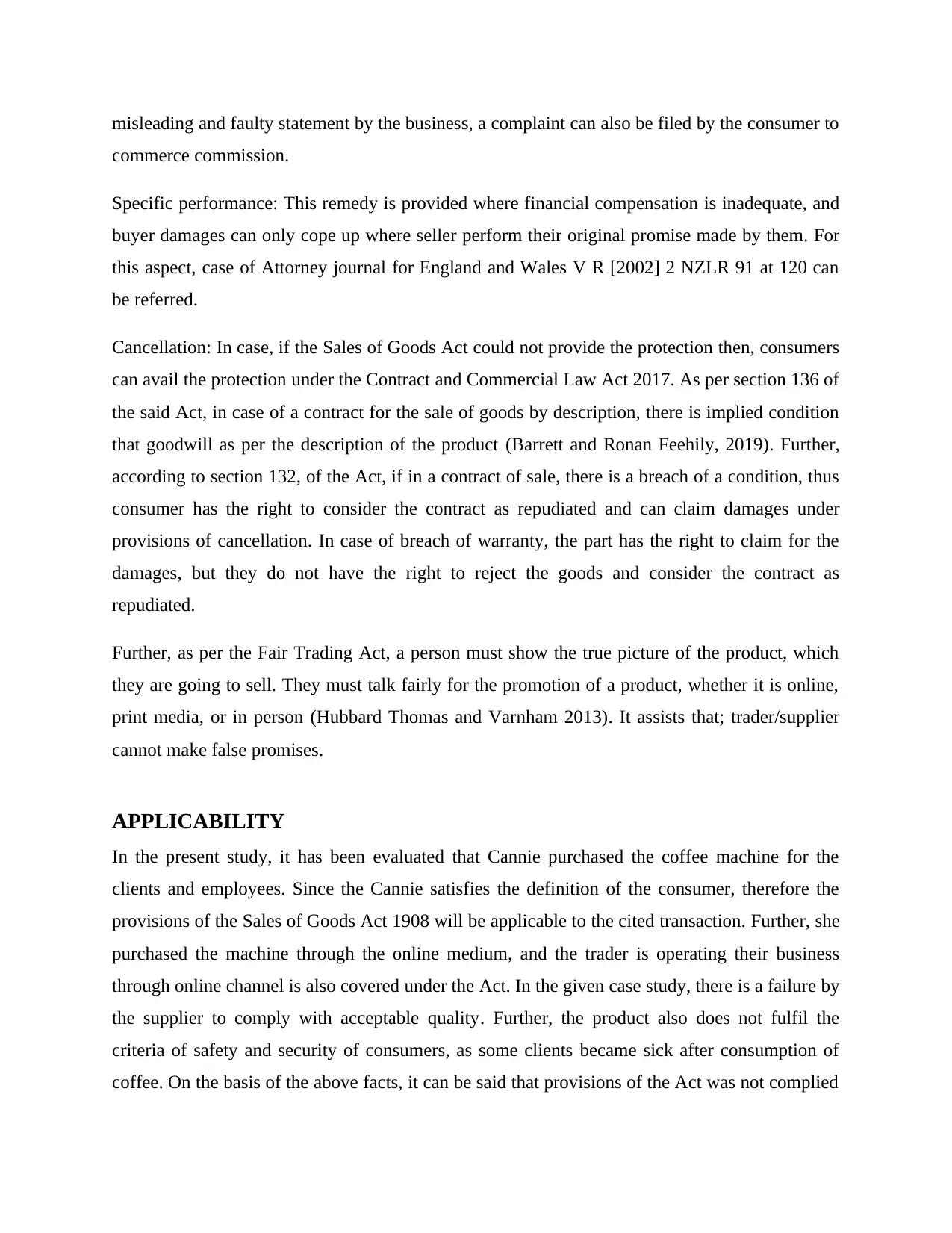
misleading and faulty statement by the business, a complaint can also be filed by the consumer to
commerce commission.
Specific performance: This remedy is provided where financial compensation is inadequate, and
buyer damages can only cope up where seller perform their original promise made by them. For
this aspect, case of Attorney journal for England and Wales V R [2002] 2 NZLR 91 at 120 can
be referred.
Cancellation: In case, if the Sales of Goods Act could not provide the protection then, consumers
can avail the protection under the Contract and Commercial Law Act 2017. As per section 136 of
the said Act, in case of a contract for the sale of goods by description, there is implied condition
that goodwill as per the description of the product (Barrett and Ronan Feehily, 2019). Further,
according to section 132, of the Act, if in a contract of sale, there is a breach of a condition, thus
consumer has the right to consider the contract as repudiated and can claim damages under
provisions of cancellation. In case of breach of warranty, the part has the right to claim for the
damages, but they do not have the right to reject the goods and consider the contract as
repudiated.
Further, as per the Fair Trading Act, a person must show the true picture of the product, which
they are going to sell. They must talk fairly for the promotion of a product, whether it is online,
print media, or in person (Hubbard Thomas and Varnham 2013). It assists that; trader/supplier
cannot make false promises.
APPLICABILITY
In the present study, it has been evaluated that Cannie purchased the coffee machine for the
clients and employees. Since the Cannie satisfies the definition of the consumer, therefore the
provisions of the Sales of Goods Act 1908 will be applicable to the cited transaction. Further, she
purchased the machine through the online medium, and the trader is operating their business
through online channel is also covered under the Act. In the given case study, there is a failure by
the supplier to comply with acceptable quality. Further, the product also does not fulfil the
criteria of safety and security of consumers, as some clients became sick after consumption of
coffee. On the basis of the above facts, it can be said that provisions of the Act was not complied
commerce commission.
Specific performance: This remedy is provided where financial compensation is inadequate, and
buyer damages can only cope up where seller perform their original promise made by them. For
this aspect, case of Attorney journal for England and Wales V R [2002] 2 NZLR 91 at 120 can
be referred.
Cancellation: In case, if the Sales of Goods Act could not provide the protection then, consumers
can avail the protection under the Contract and Commercial Law Act 2017. As per section 136 of
the said Act, in case of a contract for the sale of goods by description, there is implied condition
that goodwill as per the description of the product (Barrett and Ronan Feehily, 2019). Further,
according to section 132, of the Act, if in a contract of sale, there is a breach of a condition, thus
consumer has the right to consider the contract as repudiated and can claim damages under
provisions of cancellation. In case of breach of warranty, the part has the right to claim for the
damages, but they do not have the right to reject the goods and consider the contract as
repudiated.
Further, as per the Fair Trading Act, a person must show the true picture of the product, which
they are going to sell. They must talk fairly for the promotion of a product, whether it is online,
print media, or in person (Hubbard Thomas and Varnham 2013). It assists that; trader/supplier
cannot make false promises.
APPLICABILITY
In the present study, it has been evaluated that Cannie purchased the coffee machine for the
clients and employees. Since the Cannie satisfies the definition of the consumer, therefore the
provisions of the Sales of Goods Act 1908 will be applicable to the cited transaction. Further, she
purchased the machine through the online medium, and the trader is operating their business
through online channel is also covered under the Act. In the given case study, there is a failure by
the supplier to comply with acceptable quality. Further, the product also does not fulfil the
criteria of safety and security of consumers, as some clients became sick after consumption of
coffee. On the basis of the above facts, it can be said that provisions of the Act was not complied
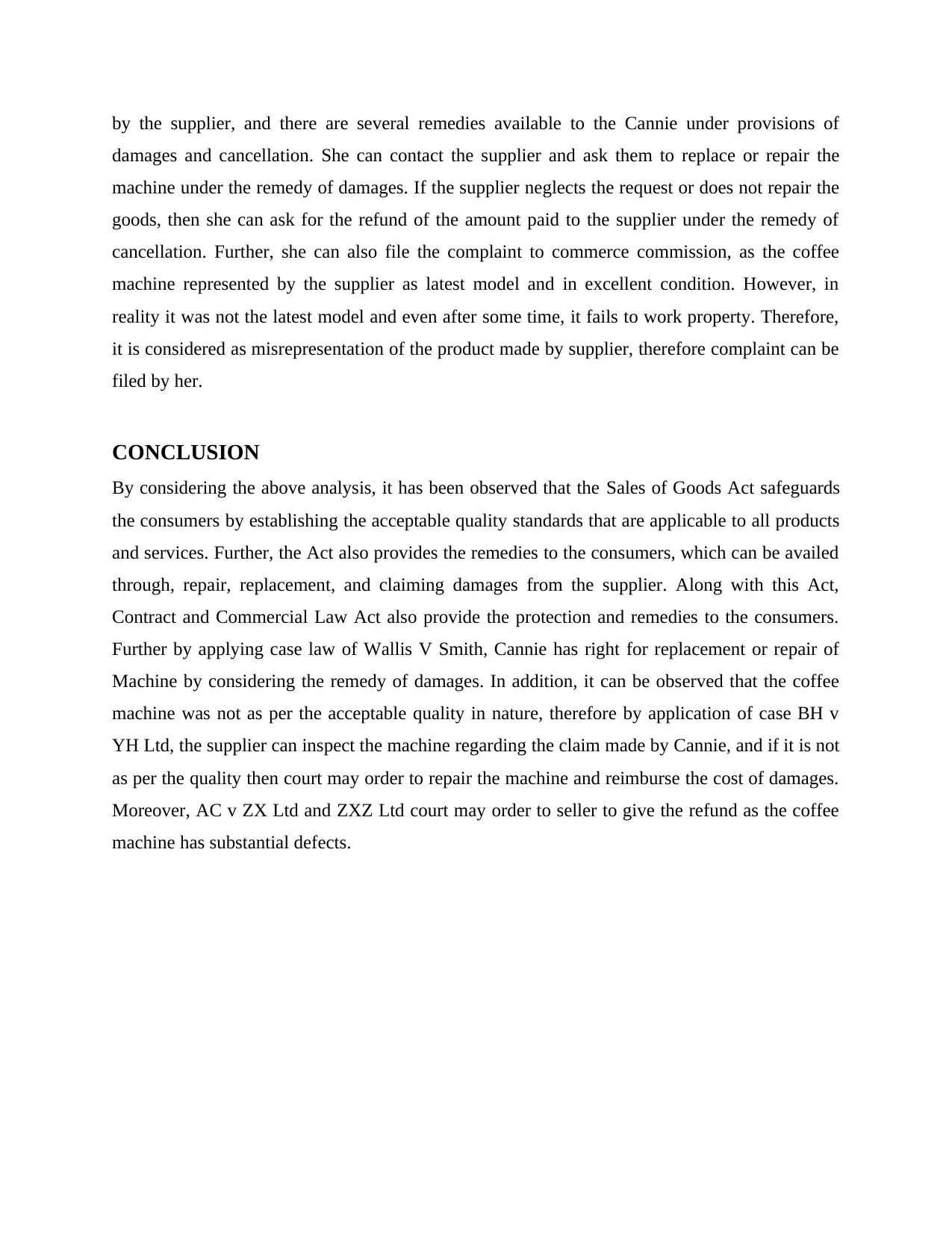
by the supplier, and there are several remedies available to the Cannie under provisions of
damages and cancellation. She can contact the supplier and ask them to replace or repair the
machine under the remedy of damages. If the supplier neglects the request or does not repair the
goods, then she can ask for the refund of the amount paid to the supplier under the remedy of
cancellation. Further, she can also file the complaint to commerce commission, as the coffee
machine represented by the supplier as latest model and in excellent condition. However, in
reality it was not the latest model and even after some time, it fails to work property. Therefore,
it is considered as misrepresentation of the product made by supplier, therefore complaint can be
filed by her.
CONCLUSION
By considering the above analysis, it has been observed that the Sales of Goods Act safeguards
the consumers by establishing the acceptable quality standards that are applicable to all products
and services. Further, the Act also provides the remedies to the consumers, which can be availed
through, repair, replacement, and claiming damages from the supplier. Along with this Act,
Contract and Commercial Law Act also provide the protection and remedies to the consumers.
Further by applying case law of Wallis V Smith, Cannie has right for replacement or repair of
Machine by considering the remedy of damages. In addition, it can be observed that the coffee
machine was not as per the acceptable quality in nature, therefore by application of case BH v
YH Ltd, the supplier can inspect the machine regarding the claim made by Cannie, and if it is not
as per the quality then court may order to repair the machine and reimburse the cost of damages.
Moreover, AC v ZX Ltd and ZXZ Ltd court may order to seller to give the refund as the coffee
machine has substantial defects.
damages and cancellation. She can contact the supplier and ask them to replace or repair the
machine under the remedy of damages. If the supplier neglects the request or does not repair the
goods, then she can ask for the refund of the amount paid to the supplier under the remedy of
cancellation. Further, she can also file the complaint to commerce commission, as the coffee
machine represented by the supplier as latest model and in excellent condition. However, in
reality it was not the latest model and even after some time, it fails to work property. Therefore,
it is considered as misrepresentation of the product made by supplier, therefore complaint can be
filed by her.
CONCLUSION
By considering the above analysis, it has been observed that the Sales of Goods Act safeguards
the consumers by establishing the acceptable quality standards that are applicable to all products
and services. Further, the Act also provides the remedies to the consumers, which can be availed
through, repair, replacement, and claiming damages from the supplier. Along with this Act,
Contract and Commercial Law Act also provide the protection and remedies to the consumers.
Further by applying case law of Wallis V Smith, Cannie has right for replacement or repair of
Machine by considering the remedy of damages. In addition, it can be observed that the coffee
machine was not as per the acceptable quality in nature, therefore by application of case BH v
YH Ltd, the supplier can inspect the machine regarding the claim made by Cannie, and if it is not
as per the quality then court may order to repair the machine and reimburse the cost of damages.
Moreover, AC v ZX Ltd and ZXZ Ltd court may order to seller to give the refund as the coffee
machine has substantial defects.
⊘ This is a preview!⊘
Do you want full access?
Subscribe today to unlock all pages.

Trusted by 1+ million students worldwide
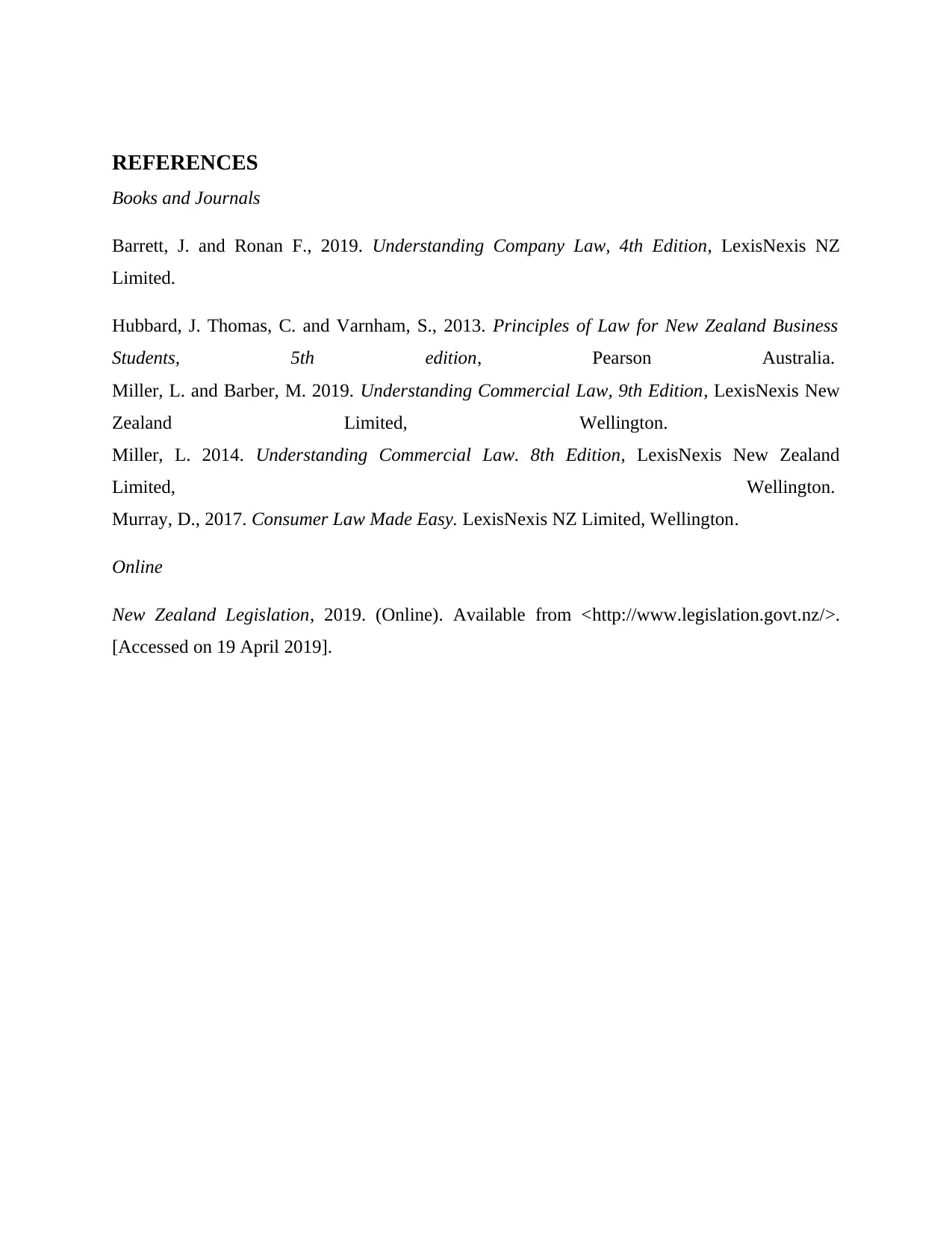
REFERENCES
Books and Journals
Barrett, J. and Ronan F., 2019. Understanding Company Law, 4th Edition, LexisNexis NZ
Limited.
Hubbard, J. Thomas, C. and Varnham, S., 2013. Principles of Law for New Zealand Business
Students, 5th edition, Pearson Australia.
Miller, L. and Barber, M. 2019. Understanding Commercial Law, 9th Edition, LexisNexis New
Zealand Limited, Wellington.
Miller, L. 2014. Understanding Commercial Law. 8th Edition, LexisNexis New Zealand
Limited, Wellington.
Murray, D., 2017. Consumer Law Made Easy. LexisNexis NZ Limited, Wellington.
Online
New Zealand Legislation, 2019. (Online). Available from <http://www.legislation.govt.nz/>.
[Accessed on 19 April 2019].
Books and Journals
Barrett, J. and Ronan F., 2019. Understanding Company Law, 4th Edition, LexisNexis NZ
Limited.
Hubbard, J. Thomas, C. and Varnham, S., 2013. Principles of Law for New Zealand Business
Students, 5th edition, Pearson Australia.
Miller, L. and Barber, M. 2019. Understanding Commercial Law, 9th Edition, LexisNexis New
Zealand Limited, Wellington.
Miller, L. 2014. Understanding Commercial Law. 8th Edition, LexisNexis New Zealand
Limited, Wellington.
Murray, D., 2017. Consumer Law Made Easy. LexisNexis NZ Limited, Wellington.
Online
New Zealand Legislation, 2019. (Online). Available from <http://www.legislation.govt.nz/>.
[Accessed on 19 April 2019].
1 out of 7
Related Documents
Your All-in-One AI-Powered Toolkit for Academic Success.
+13062052269
info@desklib.com
Available 24*7 on WhatsApp / Email
![[object Object]](/_next/static/media/star-bottom.7253800d.svg)
Unlock your academic potential
Copyright © 2020–2026 A2Z Services. All Rights Reserved. Developed and managed by ZUCOL.





